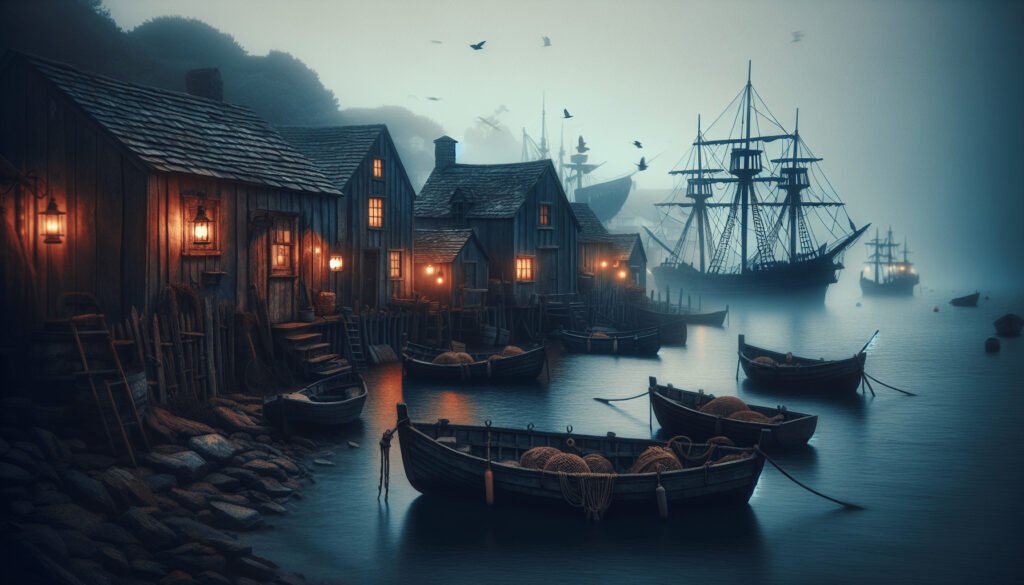Ever wondered which cozy little fishing villages welcomed pirates with open arms? Yes, the ones where your Sunday fish fry might come with a side of plundered gold doubloons and a hearty “Ahoy there!” Tales of piracy often evoke images of lawlessness on the high seas, but many pirate-friendly fishing villages played eager hosts to these sea-faring rascals. Let’s break it down and see what made certain coastal communities throw open their doors to some of the most notorious rule-breakers of all time.

The Curious Case of Coastal Communities and Their Pirate Pals
Breaking Bread or Breaking Laws?
First off, can you imagine the surprise dinner conversation in a fishing village where pirates are regulars? “Pass the salt, and oh, by the way, how’s the latest illegal haul from Spain?” The peculiar relationship between pirates and these villages was far from the romanticized notion of swashbuckling anti-heroes. In reality, it was more of a gritty symbiosis.
For these fishing villages, aligning with pirates wasn’t just about the excitement of shenanigans and buried treasures; it had a lot to do with survival, economics, and sometimes sheer necessity. Many of these communities struggled to make ends meet. When the sea wasn’t bountiful, they might have looked at pirates and thought, “Well, they seem to be getting fish… and everything else.”
Pirates as Economic Stimulus
Yes, having pirates dock at your village was the 18th century version of winning the lottery. It’s like finding out your neighbor, the one you were sure was running a shady business, is suddenly rolling in cash. You might question the legality, but you’re definitely curious about borrowing a cup of sugar. In pirate-friendly villages, pirates would buy provisions, repair their ships, and spend gold like a sailor on shore leave—because that’s exactly what they were.
In return for their hospitality, pirates sometimes offered protection against other sea marauders. Think of it as the pirate pat-on-the-back reward program. Interestingly enough, these unofficial alliances created a buffer against poverty and external threats, making survival less precarious.
The Gang’s All Here: Noteworthy Pirate-Friendly Villages
Port Royal, Jamaica – The Original Pirate Hub
Ah, Port Royal! If fishing villages were high school, Port Royal would be the cool kid who throws the wildest parties. By the late 17th century, this Jamaican town had become a notorious pirate haven. Not by accident or oversight, but because the British authorities turned a blind eye. Why? Because pirates like Henry Morgan didn’t just pillage; they rallied forces against Spain, making them unofficial military assets. Funny how “hero” and “villain” can be interchangeable depending on who’s holding the ledger, huh?
Salem, Massachusetts – Witches and… Pirates?
Salem isn’t just about witch trials and tourist traps selling “authentic” spell books (spoiler: they aren’t). This town also played host to privateers during the American Revolution. Okay, privateers are just pirates with government permission, but let’s not split hairs. During the war, privateers based in Salem brought in as many as 445 captured enemy ships. The profits from this illegal-yet-sanctioned activity bolstered both individual merchants and the town itself.
Madagascar – Pirates’ Permanent Paradise
Madagascar is where the real high-seas gangsters retired, or at least hid out between heists. Carousing amongst the local Malagasy communities, pirates found refuge and sometimes intermarried, creating semi-legitimate ties. Ile Sainte-Marie, off the eastern coast of Madagascar, was practically a pirate retirement community complete with graves still marked with skull and crossbones. Shiver me timbers, right?

Symbiotic Relationships: Fishermen and Pirates
Safety in Numbers… and Cannons
Fishermen needed protection. Pirates needed provisions. It was a match made in morally ambiguous heaven. In many cases, small fishing villages didn’t exactly keep government forces at bay; they simply didn’t snitch. They reaped the safety net pirates provided, bartering fish and local produce for stolen goods or gold. It’s a bit like the shady underbelly of Amazon next-day delivery—if you don’t ask questions, fast shipping and lots of surprises come your way.
Booty Economics
Ever heard of barter economy? Well, pirates and fishermen had their own version. Gold coins, captured goods, and even captured ships often found their way into the hands of villagers. Instead of a quaint “Trading Places” scenario, it was more “Trading Plunder.” Fish, wine, bread, and sometimes information about rival ships or patrols were traded. It created a micro-economy all its own—a piratey quid pro quo, if you will.
Keeping it in the (Pirate) Family
It wasn’t uncommon for fishermen to have direct family ties to pirates, either as former mariners or distant cousins. The sea is a small world, and networks ran deep. It wasn’t just transactional; it was personal. Imagine Thanksgiving dinners where smugglers, sailors, and townsfolk came together, filling the table with everything from everyday catches to exotic spices and silks—legitimately or otherwise acquired.
The Moral Gray Area: Villains or Protectors
Legal Schmegal
Many fishing villages turned pirate havens existed in that moral gray area we all secretly love. Sure, they were aiding and abetting criminals, but they were also safeguarding their livelihood. If modern corporate ethics make your brain spin, pirate ethics would probably make it implode. The lines between hero and villain were blurred, based on who you asked. Pirates might have been dreaded on the high seas, but back in the villages, they were something between Robin Hood and a really well-connected cousin.
Taverns and Tall Tales
Taverns were the nerve centers of this unique arrangement. Fishermen and pirates swapped stories and sometimes strategies over tankards of ale. These taverns became informal town halls where trust and information were currency. It’s a bit like the ultimate “man cave” but with exponentially more risk. And by “risk,” I mean you might just have to dodge a flying dagger or two if you spill the wrong kind of beans.
What Can We Make of All This Today
Lessons in Economic Adaptability
Survival often leans on flexibility and creativity, even if it means forging uneasy alliances. These fishing villages exemplified pragmatic survival mechanisms. We could stand to learn a little something from their adaptability—their willingness to think outside the fishnet. Desperate times may call for desperate measures, but community and mutual gain will always be resilient strategies.
The Nuance of Human Morality
Humans are morally complex beings. Villains aren’t always pure evil, and law-abiding citizens sometimes bend the rules. These villages did what they had to do, showing us that moral certainties are often luxuries of the comfortable and that ethics can be fluid depending on survival needs.
Evolving Legends
If nothing else, these tales remind us how history isn’t just written in textbooks but lived in real-time, evolving through necessity and culture. Knowing this might make your next beach vacation a bit more intriguing. Picture this: as you sip your cocktail by the shore, consider the complex stories hidden beneath the waves you’re gazing at—stories of deception, survival, and camaraderie.
In Conclusion: Pirates, Fish, and the Fine Line Between
So, let’s wrap this up by saying that the relationship between pirates and their port-side pals wasn’t merely transactional; it was transformational. It was a melding of needs, culture, and mutual understanding in the murky waters of legality and morality. Next time you think of pirates, remember they weren’t just lone wolves; they were often community figures, affecting and being affected by the villages they called home.
Which leads me to ask: Are we more pirate than we’d like to admit, living in our own morally gray areas? Arrr, that’s food for thought.